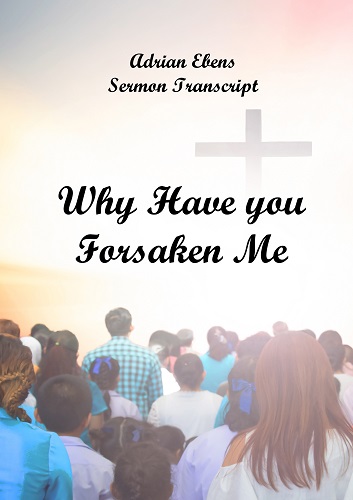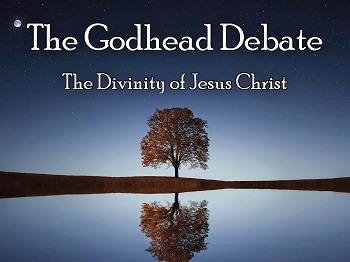Protesting the Heresy of Dividing the Law and the Gospel
Originally Entitled: "James White on Mutual Obligation"
On May 23, 1871, James White began a five part series in the Advent Review and Herald of the Sabbath entitled “Mutual Obligation.” Wanted to include highlights here as I believe the council will be of benefit to us today. I encourage you to read the complete series available from Adventist Archives. To access the articles from that website, page down the left side of your screen and click on “Review and Herald.” In the search engine that will come up on the screen type in “Mutual Obligation” with quotes and press “Enter” on your keyboard and you will be able to view or download the articles to your computer from there.
As the series begins Elder White introduces us to the principle of mutual obligation and addresses the obligation of God to man and man to God, and how it works in all family arrangements that are to be successful.
“The principle of mutual obligation lies at the very foundation of all government, in Heaven, or on earth. In love, God made man. In love infinite, he gave his Son to save man, when lost in base transgression. God's love in man's creation, and in the plan for his redemption, places man under unmeasurable obligation to God. In the gift of his dear Son, God has given a pledge of infinite love to those who obey him. And the principle of mutual obligation, requiring mutual love, fully justifies the demand of God that man should love him supremely. "And thou shalt love the Lord thy God with all thine heart, and with all thy soul, and with all thy might." Deut. 6:5…
Mutual obligation is the basis of all civil government. The legislative power assumes the obligation of acting for the best good of the people. And all the friends of law and order will cherish the highest regard for such government, and feel under sacred obligations to the government. And thus the obligations are mutual.”
In part two of the series from June 6, 1871, he addresses mutual obligation as it relates to the church.
“There is no relation, which men sustain to each other in this life that demands mutual obligation more imperatively than church relation. God has ordained it, and has set forth in general terms in his word the duty of leaders and those that should be led; of ministers and those that are ministered unto. And not only has God's word spoken in general terms of the mutual obligations of all the members of the church of Jesus Christ, but it also enters quite minutely into the several duties of pastor and people, and the relation which the several members sustain to the leaders of the church.
Adventism has been terribly cursed with the reckless spirit of ultra come-outism. And, with very many, organization and order have been regarded as an abridgment of religious liberty. These would have every man and woman constitute an independent church, each moving off toward Heaven according to his or her own plan. And these sometimes cherish a spirit of bitterness against the doctrine of mutual obligation. This is in harmony with the untamed and almost untamable feelings of unsanctified independence, and natural self-sufficiency. It is most probable that these persons grew to manhood and womanhood without learning submission to parental government, and the result of that terrible mistake is now seen in their Christian experiences.
The manifestation of this spirit may be expected in the rash and irresponsible, in any cause and at any time. And that it should be largely manifested among Adventists who left the different religious bodies in expectation of the speedy second advent, as an act necessary for a preparation for that event, is not so remarkable. But that any—after the lapse of more than a quarter of a century, during which time the baneful result of ultra come-outism have been fully seen in those Adventists disposed to fanaticism—should reject the doctrine of mutual obligation, so clearly taught by the sacred Scriptures, is astonishing. We most clearly recognize a vein of insanity in this wild spirit of insubordination…
God is the same in all dispensations. The great principles of his moral government are as changeless as their divine Author. We solemnly protest against the heresy that the law and the gospel are opposed to each other. We have no sympathy with that lax gospel that contrasts the rigor of divine truth from God to the people through Moses, with the freedom of divine truth from God to the people through Jesus Christ. God is the same, yesterday, to-day, and forever. Moral principle is the same in every age.
And while it is freely admitted that all those shadowy ceremonies, which found their substance in the death of Christ, and in his ministry, were blotted out, and nailed to the cross of Jesus Christ, it is denied that the death of the Son of God, or the change of dispensations, in the least degree, affected those moral principles underlying the Jewish religion. These demanded of the people, order, neatness, cleanliness, justice, mercy, and benevolence to the widow, the fatherless, and the suffering poor. The carrying out of these pure and indispensable principles required the most thorough organization, the most willing subordination to God's appointed leaders, and the strictest obedience to the voice of divine truth from Heaven to the people through Moses.
With this view of the subject, let us look back to the organization and order of the Jewish church found in the books of Moses. And while we may admire that organization, and wonder at the divine perfection of the principles of purity, order, mercy, and justice, underlying God's great system of truth urged upon the Jewish people, let us learn lessons from the voice of God to his ancient people. We repeat it; we solemnly protest against this popular heresy that arrays the law and the gospel against each other, and the voice of God touching moral principle through Moses to the people, against his voice relative to moral principle to the people of this age through Jesus Christ. These teachers of a perverted gospel make God a being of change. He required of the Jews most perfect order; but, according to their lax notions of matters and things, the gospel tolerates freedom that leads to confusion. God then had leaders, and required of the people a spirit of subordination and obedience to established law; but many, who glory in the liberty of the gospel, deny leadership, and, while they may profess to be led by the Holy Spirit, evidently are led by their own spirit, which is ever restless under wholesome restraint.”
It is interesting to see this historical Adventist church perspective. More will be highlighted from the series in another blog.





